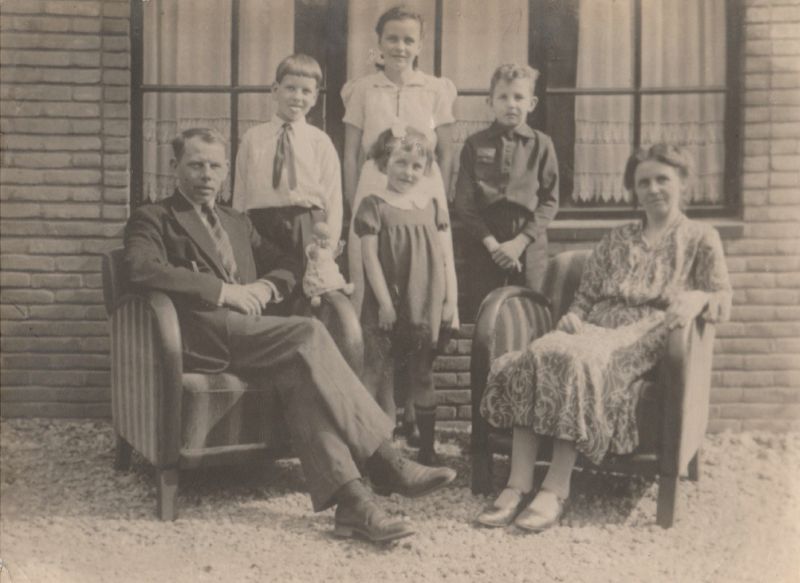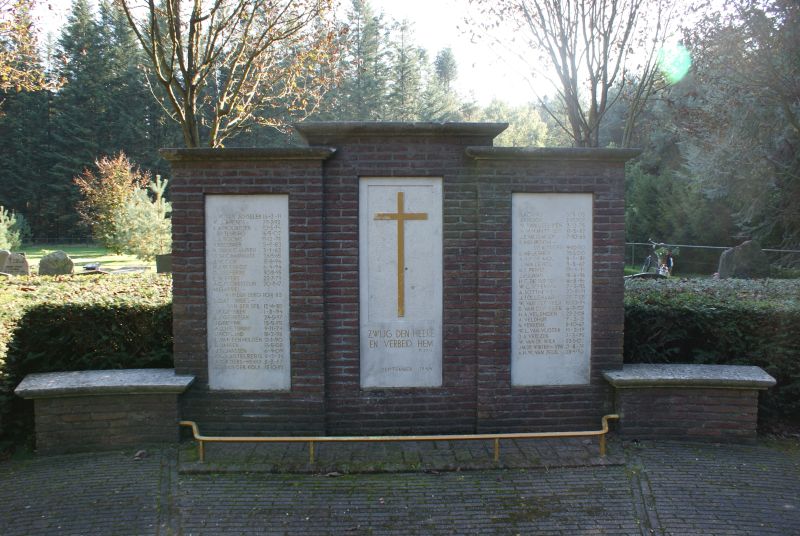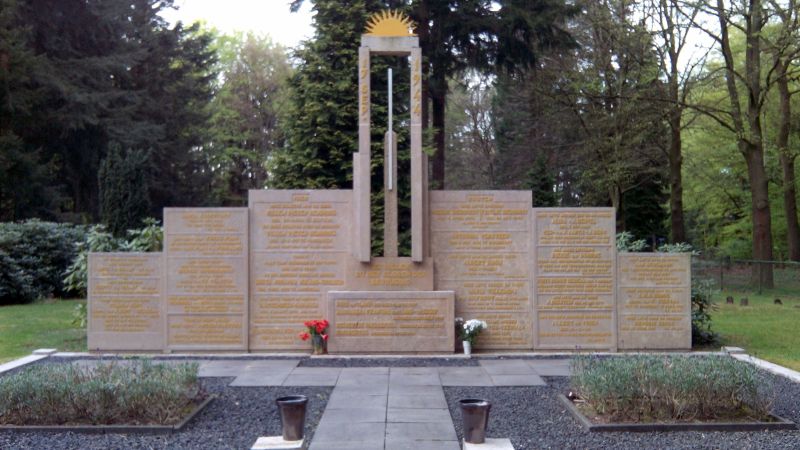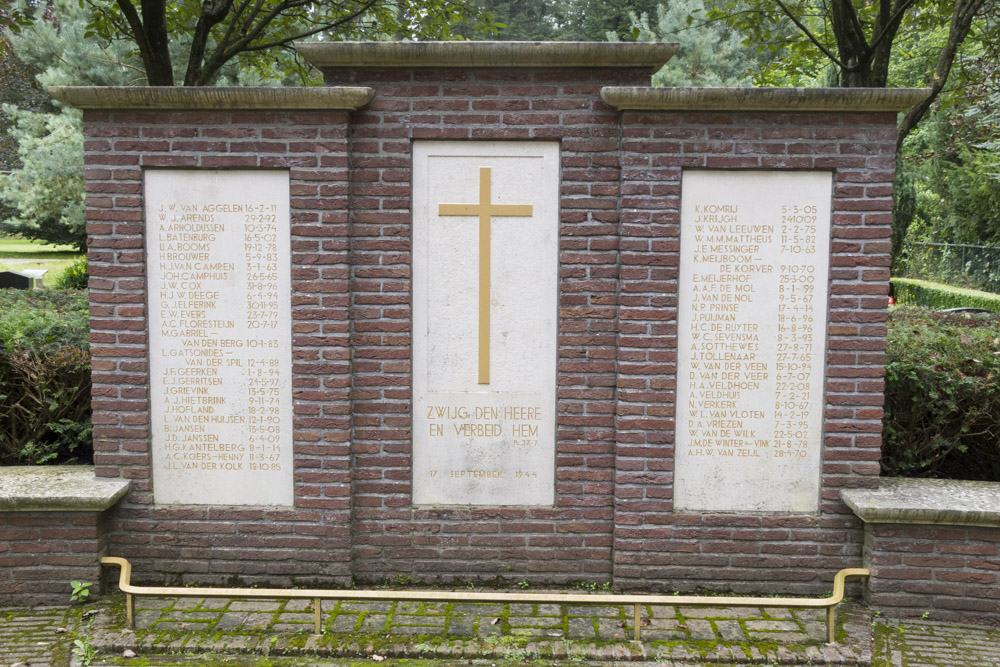Introduction
The following text tells the story of Dick van ‘t Land. As a 17-year-old boy, he survived the bombing on Wolfheze, although he lost his father, mother, brother, and sister in one fell swoop. The story of what he went through has been recorded at the request of his daughter Tineke.
His story
Background
During the first few years of World War II, life in Wolfheze went by relatively quietly. At most, there were some air battles between Allied and German warplanes. It did become more restless gradually because the Germans deployed anti-aircraft guns and sometimes, a plane would crash in the area. Every now and then, the Allies would bomb Deelen air base, and my grandfather would climb the water tower so he could get a good view of everything.
My grandfather was a train driver who was employed by the psychiatric facility Stichting Wolfheze. He lived with his family in a house on the terrain near the water tower. My grandmother was in charge of the housekeeping. She was a very pious woman who, like many other people who lived in the village, probably believed in the will of God. This caused her to have a passive attitude, and she did not take any precautions to protect her family. She did take a great risk housing people who were in hiding and even if the Germans had caught and punished them, she would have considered it to be God’s will.
My grandfather thought of the war in a black-and-white manner. He considered all Germans to be bad and the Allies were good from his perspective. If someone could have told him beforehand that he and most of his family would perish due to the actions of the Allies, he never would have believed it.
Their son Dick - my father -, attended school in Arnhem during these years. His physics and chemistry teacher taught his students how they would have the most chance of survival in case of a bombing. The safest spot was the basement and the alternative was taking shelter under the stairs but if these options were lacking, you had to lie flat on the ground. This was regularly practised in the gymnasium. It would save my father’s life.

Dick van ‘t Land’s family, presumably around 1940. He is the boy with the curly hair on the right. The youngest girl is his younger sister Willy. Source: Tineke van’t Land.
Bombing
Sunday morning September 17, 1944. The church service always began at 10:00 yet only half of the seats were filled. People had stayed home out of fear for razzia’s. When the minister started his sermon, it became very turbulent in the air. Aeroplanes flew over. The members of the congregation heard that bombings were taking place in the distance. The minister therefore interrupted his sermon and everyone went home.
Then, at 11:37, all hell broke loose. The United States Army Air Force carpet-bombed the village with its institute for the blind and psychiatric facility Stichting Wolfheze. My father was standing in the doorway of his house together with his eldest sister, his brother, and a hider. When my father saw the bombs were being thrown, he immediately thought about the lessons he learned at school. The bombs shattered into pieces and did their destructive job.
After the bombing, my father heard screams from the kitchen. He came out of his hiding place and immediately noticed that the others were dead. He made his way through the debris. Underneath the mutilated body of his mother, he found his eleven-year-old sister Wil to be badly wounded. An disabled aunt, who was sitting on a foot stove in a niche of the kitchen, was unscathed. The three of them fled the remains of the house. Sister Wil was brought to a pavilion so she could be cared for. Although she survived, she remained disabled.
Hiding place
Together with many others, my father found a primitive hiding place in a concrete root cellar. They spent a few days there on the potatoes, fearful and plagued by hunger and thirst especially. Only after a few days, the entire group left the dark root cellar to take shelter in the more spacious cellar of the central kitchen of the Foundation.
There was a desperate need for drinking water. As the bombings had ruined the pipes from the water tower, drinking water could only be obtained outside the Foundation. Between the fights, young men were sent to a signal house to get water from a well with a hand pump, or to scrape up food here and there.
This whole time, the bodies of my grandparents, uncle, and aunt were lying under a pyle of debris from their house. The bodies of dozens of other victims of the bombing were also still lying above ground.
During the bombing, a group of men had been walking between the pavilions of the Foundation and they were hit head-on by the fragmentation bomb. This had a horrific, destructive result for there was not much left of their bodies. Cats started dragging the human remains along. A gruesome image for the people who had to get food or water.
It was fairly warm for the time of year and the remains desperately needed to be buried. It was decided that a large pit would be dug on the cemetery which would serve as a mass grave. As the Allied planes shot everywhere where digging was taking place, it was a precarious task. Men had to work up the courage to dig up there. They constantly had to stop digging to find shelter. The pit did not become very deep because it was life-threatening to dig it and the men wanted to finish it as quickly as possible. With wheelbarrows, eighty-one bodies were literally dumped in the pit. After the war, there were still all kinds of things sticking out of the mass grave.
Evacuation
On Wednesday September 27, the Germans ordered an evacuation of the entire area. The Foundation did not have an evacuation plan prepared, but the group left on foot in the direction of Ede. The wounded were transported by others in carts and wheelbarrows. The pulling and pushing proved to be too much for some due to malnutrition. As a result of their injuries and hardships, many people are said to have died along the way.
Eventually, most of them were accommodated in Barneveld and Lunteren. My father was picked up by his father’s brother and spent the remainder of his youth with his aunt and uncle, separated from his little sister Wil, who recovered fairly well and was taken in by family members of their mother.

Memorial on the graveyard in Wolfheze for the fallen residents of the psychiatric facility. There are 51 names on the memorial. Source: Tineke van’t Land.
Taboo
After the liberation, the Netherlands mostly focused on reconstructing the country. The liberators were our heroes. My father also picked up his life. He got a job, a wife, and four children. During my youth, I never heard him complain. He never spoke a bad word about the Allies. We sometimes visited the mass grave. We were silent for two minutes during the commemoration of the victims of war, and celebrated on May 5. But as time went by, the taboo began to break and more openness was offered about the faults the Allies had made. It was only fifty years after the War that Prince Bernhard made some confessions, and my father also started talking. He slowly started to process what had happened in Wolfheze.
Grey Mice
In the course of the War, the Germans claimed the Neder-Veluwe clinic. Female soldiers who served as telephone operators on the air base were housed there. They also guided aeroplanes through radio service. Due to the colour of their uniforms, they were colloquially called ‘Grey Mice’.
The executive board of the Foundation made an agreement with the Germans that my grandfather would be responsible for the maintenance of the heating, electronics, water, and such. His immediate superior was the vice president of the Foundation, who was also the head of the Air Raid Protection Service. My grandfather reported to him how many ‘Grey Mice’ there were and what they were doing. This information was forwarded to the Dutch resistance movement, which passed it on to London.
After some time, the ‘Grey Mice’ left the clinic. Some six hundred male soldiers who came straight from the front in France and Belgium came in their place to regroup themselves. My grandfather tried to gain as much information as possible to give to the vice president, who would then update the resistance movement in London.
A brave plan
Around Dolle Dinsdag (crazy Tuesday), September 5, 1944, the resistance movement made a fatal mistake. They devised a brave plan and kidnapped an unimportant member of the NSB. If only they had never done it! The Germans immediately arrested three people from Wolfheze. They threatened to shoot them unless the member of the NSB would be returned within a certain time frame.
The liberation movement then notified the police from Oosterbeek. The man was held in a shed on the heathland and the police then handed him over to the Germans. The Germans subsequently organised razzia’s in order to arrest the members of the liberation movement.
There was complete chaos in Wolfheze. Not only the members of the liberation movement, but also the doctors of the Foundation excluding the vice president, head of the Air Raid Protection Service, went into hiding. He stayed but alternated between pavilions in which he took shelter. The head gardener, who cycled around daily with his tools, kept the head of the Air Raid Protection Service updated on the ins and outs of the village and the Foundation. Meanwhile, the Germans placed (thirty-nine?) brand-new cannons on the terrain and in the forests (this information has not been verified by the owner of the estate). On September 16, a large quantity of ammunition was stored between the pavilions, which of course brought much danger.
High price
On Friday September 15, my grandfather discovered that most Germans had left the facility. Since he did not know where his superior was hiding at that point, my grandfather was unable to do anything with that knowledge! This situation proved to be fatal for Wolfheze, for the Allies believed that there were still six-hundred German soldiers of the front stationed in the Foundation. They wanted to eliminate those soldiers with bombings. If the Allies had not carried out the bombings then the paratroopers could have made great use of the cannons and the ammunition on the terrain. But above all: if the Allies had not carried out the bombings, Wolfheze never would have paid such a senseless, high price!
Definitielijst
- NSB
- National Socialist Movement. Dutch political party sympathising with the Nazis.
- paratroopers
- Airborne Division. Military specialized in parachute landings.
- Raid
- Fast military raid in enemy territory
- razzia
- Organised round-up of a group of people. This could be Jews but also persons in hiding or other groups.
- resistance
- Resistance against the enemy. Often also with armed resources.
Information
- Article by:
- Mia van den Berg
- Translated by:
- Sebastiaan Berends
- Published on:
- 08-11-2024
- Feedback?
- Send it!





